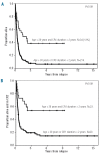Outcome after relapse of acute lymphoblastic leukemia in adult patients included in four consecutive risk-adapted trials by the PETHEMA Study Group
- PMID: 20145276
- PMCID: PMC2857188
- DOI: 10.3324/haematol.2009.014274
Outcome after relapse of acute lymphoblastic leukemia in adult patients included in four consecutive risk-adapted trials by the PETHEMA Study Group
Abstract
Background: About one half of adults with acute lymphoblastic leukemia are not cured of the disease and ultimately die. The objective of this study was to explore the factors influencing the outcome of adult patients with relapsed acute lymphoblastic leukemia.
Design and methods: We analyzed the characteristics, the outcome and the prognostic factors for survival after first relapse in a series of 263 adult patients with acute lymphoblastic leukemia (excluding those with mature B-cell acute lymphoblastic leukemia) prospectively enrolled in four consecutive risk-adapted PETHEMA trials.
Results: The median overall survival after relapse was 4.5 months (95% CI, 4-5 months) with a 5-year overall survival of 10% (95% CI, 8%-12%); 45% of patients receiving intensive second-line treatment achieved a second complete remission and 22% (95% CI, 14%-30%) of them remained disease free at 5 years. Factors predicting a good outcome after rescue therapy were age less than 30 years (2-year overall survival of 21% versus 10% for those over 30 years old; P<0.022) and a first remission lasting more than 2 years (2-year overall survival of 36% versus 17% among those with a shorter first remission; P<0.001). Patients under 30 years old whose first complete remission lasted longer than 2 years had a 5-year overall survival of 38% (95% CI, 23%-53%) and a 5-year disease-free survival of 53% (95% CI, 34%-72%).
Conclusions: The prognosis of adult patients with acute lymphoblastic leukemia who relapse is poor. Those aged less than 30 years with a first complete remission lasting longer than 2 years have reasonable possibilities of becoming long-term survivors while patients over this age or those who relapse early cannot be successfully rescued using the therapies currently available.
Figures


References
-
- Larson RA, Dodge RK, Burns CP, Lee EJ, Stone RM, Schulman P, et al. A five-drug remission induction regimen with intensive consolidation for adults with acute lymphoblastic leukemia: Cancer and Leukemia Group B study 8811. Blood. 1995;85(8):2025–37. - PubMed
-
- Gökbuget N, Hoelzer D, Arnold R, Böhme A, Bartram CR, Freund M, et al. Treatment of adult ALL according to protocols of the German Multicenter Study Group for Adult ALL (GMALL) Hematol Oncol Clin North Am. 2000;14(6):1307–25. - PubMed
-
- Annino L, Vegna ML, Camera A, Specchia G, Visani G, Fioritoni G, et al. Treatment of adult acute lymphoblastic leukemia (ALL): long-term follow-up of the GIMEMA ALL 0288 randomized study. Blood. 2002;99(3):863–71. - PubMed
-
- Takeuchi J, Kyo T, Naito K, Sao H, Takahashi M, Miyawaki S, et al. Induction therapy by frequent administration of doxorubicin with four other drugs, followed by intensive consolidation and maintenance therapy for adult acute lymphoblastic leukemia: the JALSG-ALL93 study. Leukemia. 2002;16(7):1259–66. - PubMed
-
- Thomas X, Boiron JM, Huguet F, Dombret H, Bradstock K, Vey N, et al. Outcome of treatment in adults with acute lymphoblastic leukemia: analysis of the LALA-94 trial. J Clin Oncol. 2004;22(20):4075–86. - PubMed
Publication types
MeSH terms
Substances
LinkOut - more resources
Full Text Sources
Other Literature Sources
Medical

